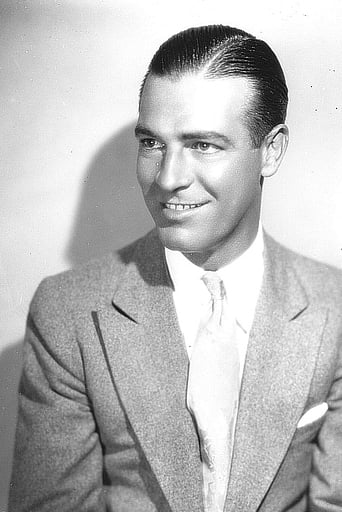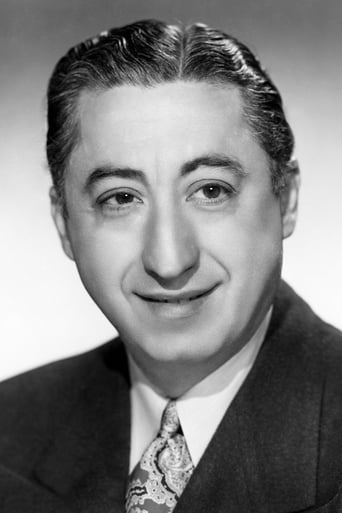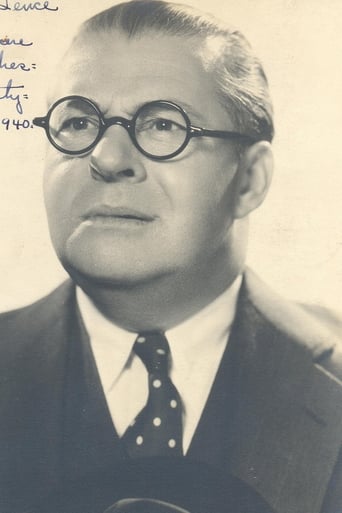Grimossfer
Clever and entertaining enough to recommend even to members of the 1%
Senteur
As somebody who had not heard any of this before, it became a curious phenomenon to sit and watch a film and slowly have the realities begin to click into place.
Robert Joyner
The plot isn't so bad, but the pace of storytelling is too slow which makes people bored. Certain moments are so obvious and unnecessary for the main plot. I would've fast-forwarded those moments if it was an online streaming. The ending looks like implying a sequel, not sure if this movie will get one
Phillipa
Strong acting helps the film overcome an uncertain premise and create characters that hold our attention absolutely.
calvinnme
The Warner Archives got this one right. The last time this film was shown in its entirety on TCM back in the 1990's, the color finale was still lost. After it was found, the restored film was never shown on TCM to my knowledge, but the discovered color finale was often shown on Turner Classic Movies under its "One Reel Wonder" series between films. The Warner Archives DVD-R release restores the color finale to the film itself, so we get to see it as it was supposed to be seen and was seen in 1929.The story involves sisters Babe and Casey Hogan, (Vivian and Rosetta Duncan), salesgirls at a department store, which is ruled somewhat like a banana republic in that store employees are required to assemble and sing the store song each morning. The girls have been orphaned since Babe was a child, and Casey is the older sister. Thus Casey is accustomed to looking after sister Babe and deflecting the advances of Jimmy Dean (Lawrence Grey), who has a strong romantic interest in younger sister Babe. This was the Duncan Sisters' only sound film, and they come across oddly on camera. Vivien is somewhat like a husky Anita Page, and Rosetta reminds me in voice and actions of Lucille Ball, although Rosetta does not have Lucy's delicacy of features.Pieces of this story looks like it inspired Singing in the Rain. For example, there is a show by and for the department store employees about half way into the film that includes a fashion show. A song is sung by a male tenor as each girl steps down a staircase to present the latest in flapper fashions - much like the Beautiful Girl number in Singin in the Rain. Also, Babe gets deathly ill towards the end of the film and goes unconscious, allowing a couple of over the top musical numbers that are the highlight of the movie - "The Hoosier Hop" and the recently found finale "Sailing on a Sunbeam". These numbers are supposed to be Babe's hallucinations as she lies unconscious. These numbers rather reminded me of the long "Broadway Melody" number in Singin in the Rain, with its wild colors and big sets in that film within a film.Recommended for those who enjoy the early sound films.
drednm
What a treat! Early talkie musical starring Broadway and Vaudeville stars, the Duncan Sisters. They sang, danced, and did comedy. This film is sort of a knock-off of THE Broadway MELODY. The Duncan Sisters were wanted for that film but were on the road, so the producers copied them in hiring Bessie Love and Anita Page. Later that year MGM snagged the Duncan Sisters for this film.They play sisters who work in a department store along with handsome Jimmy (Lawrence Gray). When smart-alec Casey (Rosetta Duncan) gets fired, they all quit and launch a career in "the show business." Jimmy is sweet on Babe (Vivian Duncan) which infuriates Casey.Anyway, they form an act built around Jimmy's songs. He plays piano while the girls sing and dance. They are a hit, but there is constant friction between Casey and Jimmy. The couple gets married and Casey goes berserk, breaking up the act. Casey goes solo, while the couple tries to make it alone. They all flop. Some time after, Babe gets really sick and Jimmy is forced to track down Casey and bring her back home.While the plot is creaky and the acting is not always very good, the musical numbers are vintage gold. "I'm Following You," which was a big hit, is sung several times. There is also a great comic version of "Tell Me Pretty Maiden," which was the theme song of FLORODORA GIRL, the terrific Marion Davies film which also starred Lawrence Gray. "The Hoosier Hop" is also solid and done in 2-strip Technicolor. Another color sequence is a fashion parade that goes comically wrong.Gray is charming and handsome and it's hard to figure why he wasn't a bigger success in talkies. He also has a great singing voice. Benny Rubin and Jed Prouty co-star.Of the sisters: Rosetta is the shorter one and the broad comic. She kept reminding me of Patsy Kelly and Beryl Mercer. Vivian was "the pretty one" and has an OK soprano voice. They duet on several songs and are quite effective. They both are passable dancers and comics. They were big stage stars but didn't do all that well in films. Their only other feature together was TOPSY AND EVA, based on their smash hit stage musical. They also did a few shorts.I liked them and thought they were both talented and personable. Maybe they could have found a niche in films. Rosetta was on the verge of a comeback on TV (WILD BILL HICKCOK) when she was killed in a car accident. Vivian apparently retired and lived to be 90.IT'S A GREAT LIFE is creaky and stagy but what a treat to see these big stars on film.
lugonian
IT'S A GREAT LIFE (Metro-Goldwyn-Mayer, 1929) directed by Sam Wood, is another one of those "Broadway Melody" variations produced during the early sound era, with the plot revolving around the up and down stage career of two singing sisters and a songwriter, in this instance, piano playing composer. What makes this one more natural to MGM's own Academy Award Best Picture winner of "The Broadway Melody" (1929), which starred Bessie Love, Anita Page and Charles King, is that this one features actual sisters in the leads. The sisters in question are The Duncan Sisters. And who are the Duncan Sisters? No, they are not the originators of the franchise of Duncan Donuts. Both blondes, they were popular vaudeville headliners with one previous feature film to their name, the silent production of TOPSY AND EVA (UA, 1927). As a result from viewing IT'S A GREAT LIFE, Rosetta (1886-1959) is best described as the shortest of the two with a flare for comedy in the manner of Winnie Lightner with a sort of raspy voice; Vivian (1899-1986), slightly taller yet prettier, sings and dances, but lacking in acting ability, especially when it comes to heavy dramatics. As with many big names during this period, the Duncan Sisters are virtually forgotten today. It's interesting to point out on how Vivian closely resembles Anita Page at one point with a cross variation to future screen actress Dorothy McGuire. Had IT'S A GREAT LIFE been distributed earlier in 1929 instead of the tail end or early 1930, it might have become an equivalent to "The Broadway Melody," considering how both films are somewhat similar in theme, which makes one wonder if the writers of "The Broadway Melody" story had the Duncan Sisters in mind. Regardless, there were no further Duncan Sisters musicals to follow, indicating that IT'S A GREAT LIFE left little or no lasting impression to 1929 audiences. By the time of its release, musicals were showing signs of decline, thus making their talking debut the final feature film for the Duncans.Synopsis in brief: Set in New York City, the story opens with a chase after two girls are seen running from their apartment building, down the street, and immediately being pursued by a policeman and some passersby, causing some traffic accidents as the girls cross through heavy traffic, ending with them heading into a department store where it is soon revealed that they are late for work. The plot development introduces the Hogan sisters, Casey (Rosetta) as the wisecracking elder sister to Babe (Rosetta). Babe loves Jimmy Dean (Lawrence Gray), with whom she works in the sheet music department. For some reason, Rosetta dislikes Jimmy, which is never revealed why. She always finding fault in him and takes every opportunity to criticize him whenever possible in hope that Babe will become discouraged and forget about him. After getting fired from their jobs following the annual store show by Mr. Mandelbaum for his disapproval of Casey's clowning, the trio make a go for the big time in vaudeville. Although they become successful, things become complicated when Babe marries Jimmy, causing problems in her relationship with Casey, thus breaking up the act. While failures on their own, they all become too stubborn to make the first move and admit their faults, even when one of them becomes seriously ill with pneumonia.The musical program: "Smile, Smile, Smile" (sung by employees); "What the Debutante Must Do" (fashion show sequence in two strip Technicolor), "I'm a Son of a ---." "Lady Love" (sung by Vivian Duncan); "I'm Following You" (sung by the Duncan Sisters); "Smile, Smile, Smile," "I'm Following You," "It Must Be an Old Spanish Custom," "Rigoletto," "It Must as Well Be You," "Let a Smile Be Your Umbrella" (sung by unseen vocalist during dramatic moment); "I'm Following You" (sung by Lawrence Gray); "Dance Number" (performed by Rosetta dressed up like a little Dutch Boy); "Hoosier Hop" (production number in two-strip Technicolor with the Duncan Sisters); and "I'm Following You." With the songs being the main attraction, only "I'm Following You" is quite memorable, even after several reprises.Aside from the aforementioned leads, only Benny Rubin as Benny Friedman, the booking agent, and Jed Prouty (who played the stuttering uncle in "The Broadway Melody" ) as David Parker, the store manager who loves Casey, assume billing in the opening casting credits while others do not.The title to IT'S A GREAT LIFE has been used several times over the years: Paramount (1935) with Joe Morrison; Columbia (1943), as part of the 28 film series featuring "Blondie and the Bumsteads" with Penny Singleton and Arthur Lake, as well as the long forgotten TV comedy series starring Michael O'Shea and Frances Bavier (1953-55).The movie as a whole is really not bad. After it is all over, it'll be hard to get these lyrics, "Wherever you go, whatever you do, I want you to know, I'm following you" out of your head. IT'S A GREAT LIFE may never be categorized as a great early musical, but mostly a curiosity for fans of movies from this particular era as well as a rediscovery look into the careers of the once popular Duncan Sisters. Only the final minutes, highlighted by a Technicolor production number choreographed by Sammy Lee, comes off a bit weak. Once shown on a frequent level on Turner Classic Movies cable channel prior to 1996, it's become more of a rarity today. (** Duncans)
Ron Oliver
A sister act finds IT'S A GREAT LIFE in show business as long as they can stick together.MGM crafted this confection as a showcase for the talents of the Duncan Sisters, of Vaudeville & Broadway fame, and as such it's an interesting relic of its era. The sound quality is remarkably good, considering its age, one of the songs is quite good, and the antique color, which highlights a couple of stage sequences, is very pleasing to the eye. As a vehicle for screen stardom, however, the film proved a disappointment. The Sisters' movie career was over almost before if could get started.Rosetta (1900-1959) and Vivian (1902-1986) do quite well as siblings who rise from performing in retail follies to the Vaudeville stage. Vivian, the pretty one, gets most of the film's few romantic moments, but Rosetta, who was an true clown able to do hilarious things with her face & body, steals the picture. When allowed to be silly she is enormous fun to watch. The script, unfortunately, keeps her character in a bad temper for much of the time, eventually wearying the viewer with her interminable fuming. She's so much more enjoyable when in a jolly mood, especially when teamed with sister Vivian. Their lovely duet, "I'm Following You," is a genuine heartwarmer.Lawrence Gray, who had made a name for himself in comic Silent film roles, makes the most of his somewhat thankless part as the piano player who captures Vivian's heart. Jed Prouty, as the department store manager who quietly loves Rosetta, and Benny Rubin, playing a Vaudeville booking agent, both do well with their small roles.The opening scene, with the Sisters madly dashing down the street to work, hotly pursued by a cop and a mob of excited New Yorkers, is one of the movie's best and gets the proceedings off to a frenzied start.





